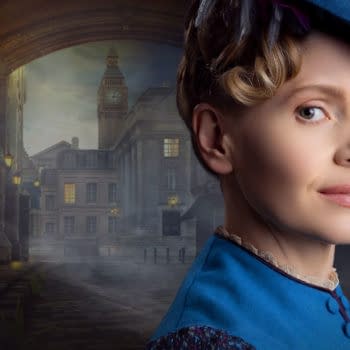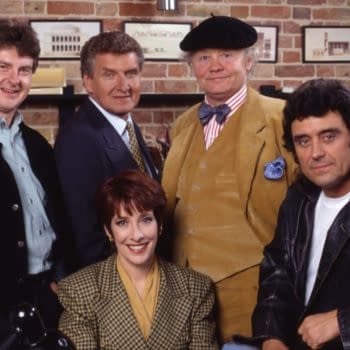Posted in: BBC, TV | Tagged: 13th doctor, action, amy pond, bbc, bbc america, bbc one, bleeding cool, cable, chris chibnall, clara, doctor who, drama, Gallifrey, jenna coleman, jodie whittaker, missy, peter capaldi, river song, series, series 10, series 8, series 9, steven moffat, streaming, tardis, television, the master, thriller, Time Lord, tv
'Doctor Who': The 12th Doctor's Flawed but Ambitious Run [BC Rewind]
Steven Moffat's run on Doctor Who with Peter Capaldi as the 12th Doctor might be the oddest, flawed, and most ambitious period of the show since its return in 2005.
Television shows tend to become an extension of the showrunners' interests and sensibilities, none more than Doctor Who. In casting Capaldi as The Doctor, Moffat could explore his ambitions to write an older, darker, and more complex lead. The next three series would also feature Moffat's most ambitious experiments in the form, structure and concepts for the show.
Gone was the childlike whimsy of Matt Smith. In Capaldi, Moffat created a Doctor who carried the weight of centuries and Time on his shoulders: this Doctor was not always warm or comforting. Capaldi embodied the angry, weary Time Lord who has lived for far too long. While retaining that core, the 12th Doctor was actually very different in each of his three seasons.
Series 8: A Good Man?

Capaldi's first season gave us the Doctor at his most aloof, prickly and even dangerous. Gone was the warmth and friendly demeanour of Smith's 11th Doctor or the cheeky amiability of David Tennent's 10th Doctor. This is not the fantasy boyfriend that those two Doctors represented to female fans. This was an old man who was socially awkward, almost autistic, and the character at his most alien. This Doctor was uncertain of himself and his place in the universe, even questioning whether he was a good man. He acknowledges that he has killed and will probably kill again, hardly a comforting trait in a character on a children's show. The underlying theme was The Doctor questioning everything about himself and what he was supposed to stand for – though he was still The Doctor as we knew him at the core.
No longer the "impossible girl" whose entire existence was to save the 11th Doctor, Moffat had to also change Clara's character. Here, she's a schoolteacher at the Coal Hill School – the same school that The Doctor's granddaughter Susan attended back in the original 1963 pilot episode – and dating a fellow teacher and former soldier Danny Pink. Clara was never a fully-formed character to start with, and Moffat tried to give her a semblance of a normal life but it still felt grafted on because we were never shown what her aspirations and wishes were when she was first introduced – now, she's suddenly a schoolteacher.
Moffat's greatest flaw as a writer is that he tended to write female characters from the outside. This applied to Amy Pond, who never really had an inner life; and River Song, who had all the affectations of a cool, tough female character but often came off more like a plot device than a character. Moffat's female characters often existed in service to and in relation to The Doctor. Even Missy, his new female reinvention of the Doctor's nemesis The Master, now has a flirtatious, sexual undertone in her relationship to The Doctor. None of Moffat's female characters ever pass the Bechdel Test. They only ever serve and orbit his male main characters.
That doesn't mean Moffat's writing this season was without merit. He was serious about deconstructing and questioning The Doctor. As a former soldier, Danny Pink calls out The Doctor as the type of superior officer who sent men to their deaths. As a black man expressing his contempt for the white authoritarian privilege of Capaldi's Doctor, this was the most aggressive attack ever on the British colonialist attitude that The Doctor often represented. It was the closest the show ever got to making The Doctor unlikeable. The more uncomfortable undertones of The Doctor and the show had been brought up from time to time in the Virgin Doctor Who novels from the 1990s – here, Moffat was bringing some of them out in the open.
Once again, Death is a subject explored on the show. Danny Pink is killed not by aliens or mad science but by something mundane: a car accident. Moffat explores Clara's grief in her betrayal of The Doctor to get Danny back, but we only really see her from the outside – unfortunately, through the prism of The Doctor rather than from her point of view. It's telling that Danny came off as a fully-formed character in his handful of episodes more than Clara does in more than one season.
Series 9: A Mid-life Crisis Story

The Doctor underwent a personality change this season – almost as if Moffat was correcting the character's excessive, alienating aloofness and harshness of the previous series. Capaldi's Doctor was warmer, funnier, and more passionate here.

This was an odd series for the show, however. While it kept the basic premise of The Doctor and his companion traveling around and getting into adventures, it grafted on the subtext of an older man having a mid-life crisis and his affair with a younger woman that's bad for both of them. Stories about older men in relationships with younger women have been a staple for a lot of British novels and TV dramas of the 70's and 80's because British publishing and television were dominated by middle-aged men. This subgenre had fallen by the wayside ever since the 1990's and I was surprised to find Moffat tackling that theme here in Doctor Who, a show that's ostensibly intended to be for kids. As I watched this season, I kept wondering how children were reacting to it. The theme of a man and younger woman in an obsessive relationship is adult – not even for teens.
In this series, The Doctor is coded as a man in mid-life crisis – he's reintroduced at the start as an aging rock star, wearing Ray Bans, playing the guitar (a reference to Capaldi's youth playing in a rock band), and with his relationship with Clara now co-dependent and enmeshed. Clara has always been a problematic character, created as a puzzle for Smith's 11th Doctor to solve rather than a fleshed-out character in her own right. She was often a cipher who changed according to what the story required rather than having her own motivations or inner life. Here, she's also acting like The Doctor and becoming addicted to reckless behaviour, and at times it felt like it was becoming The Clara Show. It's a credit to Jenna Coleman's acting skills that Clara ever felt consistent or believable at all. This series had become so top-loaded with these odd themes that it felt like the show had entered its decadent phase.
That's not to say it didn't have striking and memorable moments. Moffat could still write surprising and moving moments like The Doctor's barnstorming speech about the futility and horror of war during the Zygon invasion, and his obsessive drive to save Clara in the finale made for a poignant and shocking science fiction story in 'Hell Bent'.
Eventually, Clara's recklessness gets her killed – and Death has a much different permutation this season. It's Clara's addictive relationship with the Doctor that led to her death, and he tries to deal with his grief and guilt by trying to bring her back. His obsession leads him to abandon every principle he ever stood for – even threatening his own people, and even Time and Space itself.
It is after he pulls her back from her final moments that she recognizes their relationship has become obsessive and unhealthy. She is the one who takes control and severs their relationship by making him forget her. Only then can he return to being The Doctor again and move on.
Series 10: Back to Basics

Moffat planned to leave the end of Series 9 and 'The Husbands of River Song' would have been his final chapter, tying off every narrative thread he left dangling during his run. When his successor Chris Chibnall needed more time to finish off the third and final season of Broadchurch, Moffat decided to stay for one more season.
The clean slate let Moffat take the show back to a purer version of Doctor Who without any of the baggage behind the previous seasons: the kindly space wizard who travels Time and Space with his companions getting into adventures. Moffat also gets to play the Doctor as an old man again and not a romantic lead, referencing the show's first season in 1963. It's not spelled out, but the Doctor misses his granddaughter Susan – whose photo he keeps on his desk in his office at the university – and that's why he takes on Bill Potts as his new companion. He has effectively adopted her as a surrogate granddaughter, taking her on as a student just as Susan was a student in the first season – and when he meets Bill's flatmates, gleefully plays the role of her grandfather.
Again, The Doctor's personality has shifted from the last two series – no longer the aloof, doubt-filled immortal of series 8 or the aging rocker with a midlife crisis of series 9, his hair has grown longer and wilder as if it's an expression of his new, more emotional, more soulful persona. He's more impulsive and passionate: punching a man for a racist tirade against Bill, sacrificing himself to save her from dying in space, and so on.
This series also felt like Moffat's apology for many of the charges some fans have leveled at him. No more female companions or characters in love with the Doctor and mooning over him. Bill Potts being gay and a person of colour to counter charges of whitewashing and straight-washing. It's still not without the usual flaws, though: Missy is yet another female character defined by her relationship to the Doctor – here she grapples with her love-hate for him and whether to become good under his influence.
With a simpler season-long arc, Moffat doubled down on themes of redemption and mercy, reiterating the Doctor's moral ethics and extolling the need to be kind "without reward, without witness". This is the culmination of the 12th Doctor's arc over three series: his conclusion that after everything, the only thing that matters is kindness and doing the right thing. The main theme of this season also comes into focus in the finale: facing death and what one leaves behind.
Missy finds redemption by choosing to help The Doctor but is "killed" without his ever knowing he had changed her. Former con man and galactic petty criminal Nardole finds redemption in being of service to The Doctor and then a guardian. The Doctor, Bill and Nardole sacrifice themselves in a hopeless final battle for a band of innocents, ending with a first for the show: The Doctor dying in battle – and regenerating into his next incarnation.
Except…
Of course, this wasn't really the end. Moffat saved his best thematic explorations for last in the Christmas special 'Twice Upon a Time', a coda to The Doctor's story as well as a Buddhist parable. The Doctor comes to terms with his life and his death before he concedes to regenerate and be reborn a new person – just in time for Chibnall retooling Who into a more stripped-down show to make it feel new and fresh and without the heavy thematic layering that Davies and Moffat had done for the past ten seasons.
But Moffat's finale series was the end of an era that Davies established and he continued, infusing Doctor Who with a sense of melancholy and epic, tragic grandeur. All while under a BBC budget.












